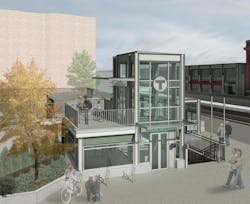FTA awards inaugural grants through All Stations Accessibility Program
The U.S. Department of Transportation (USDOT) Federal Transit Administration (FTA) awarded $686 million in grants that will improve rail station accessibility. The grants are through the All Stations Accessibility Program (ASAP), which was established through the Infrastructure Investment and Jobs Act.
The program, which is based off an existing initiative at the Chicago Transit Authority (CTA) and championed by U.S. Sen. Tammy Duckworth (D-IL), will provide $1.75 billion through 2026 to transit agencies that seek to repair, improve, modify, retrofit or relocate station elements or facilities for passenger use.
More than 30 years after the passage of the Americans with Disabilities Act of 1990 (ADA), accessibility to the entirety of certain transit systems, especially those built prior to 1990, remains a significant hurdle. National Transit Database (NTD) information shows there are 981 rail stations that are not ADA accessible out of a total of 3,726 rail stations.
USDOT and FTA officials recognize the 28 stations that will see upgrades under this first round of grant awards is a drop in a bucket, but they note it’s an important step toward greater accessibility, as well as equity in transit service.
"Every day, millions of people rely on our public transit system to get to work, buy groceries and see their loved ones—yet today, three decades after the passage of the Americans with Disabilities Act, hundreds of transit stations are still inaccessible for travelers with disabilities," said U.S. Transportation Secretary Pete Buttigieg. "The All Stations Accessibility Program is going to change that by adding wheelchair ramps, elevators and more."
FTA says it received $905 million in funding requests following the issuance of a $343 million Notice of Funding Opportunity in July 2022. Because of the strong interest, FTA awarded both the FY2022 and FY2023 grants.
"Since the passage of the Americans with Disabilities Act, great strides have been made in improving accessibility, but there is still a lot of work to do," said FTA Administrator Nuria Fernandez. "This includes modernizing rail systems in some of our most transit-oriented cities, and the ASAP program provides much-needed funding to address these overdue improvements. We want to ensure people with disabilities and others who need extra assistance are able to use transit systems with the same ease and reliability as any other user."
Where the funds were awarded
In the U.S., non-ADA accessible rail transit stations account for about 26 percent of all stations (using 2021 NTD data). Legacy rail systems have a much higher rate of non-ADA accessible stations, with nearly 49 percent of rail stations on networks in New York, New Jersey, Chicago, Philadelphia, Pittsburgh and Boston non-ADA accessible.
The grants awarded through the ASAP Program will support station upgrades in many of these regions that have higher percentages of non-ADA compliant stations.
Metropolitan Transportation Authority (MTA) was awarded $252.5 million to make the Myrtle Avenue, Norwood Avenue and Avenue I subway stations in Brooklyn and the Burnside Avenue subway station in the Bronx fully ADA accessible.
More than $185 million was awarded to CTA and Metra. CTA will use its $118.5 million grant to modernize its Irving Park, Belmont and Pulaski stations with elevators, ramp upgrades, improved station signage and other station enhancements. Metra was awarded two grants, one for $29 million to improve the 95th Street-Chicago State University station and another for $37.6 million to improve the 59th/60th Street Station on the Metra Electric line to improve accessibility and accommodate new riders from the University of Chicago expansion.
Southeastern Pennsylvania Transportation Authority was awarded more than $56 million to make the 11th Street subway station on the Market-Frankford Subway Line and the Chinatown, Erie, Fairmount Upper Level, Fairmount Lower Level and Snyder stations on the Broad Street Subway Line fully ADA accessible.
New Jersey Transit was awarded a total of $34.1 million for three projects, including $18.2 million to replace low-level platforms with higher platforms, build fully accessible ramps, install tactile warning strips, add accessible parking spaces and inclusive wayfinding technology and upgrade the communications system at the Anderson St-Hackensack and New Bridge Landing stations on the Pascack Valley Line; $14.5 million to improve accessibility at the Bradley Beach station on the North Jersey Coast Line and $1.4 million to study and design new platforms at the Chatham and Orange Stations on the Morristown Line.
Connecticut Department of Transportation will use its $29.6 million grant to retrofit three stations on its Metro-North Railroad Waterbury Branch commuter rail line.
Pittsburgh Regional Transit (PRT) was awarded $28.4 million to make the Bethel Village, Westfield, St. Anne's and Shiras stations on PRT's Red Line ADA accessible by installing a high platform for level boarding, shelters on the boarding platform, ramps, accessible signage and auditory support.
The city of Seattle, Wash., received $15 million to install ramps and other modernization work to ensure the 19602-built Seattle Center Monorail Station is fully ADA accessible.
The $8 million grant Greater Cleveland Regional Transit Authority received will make its East 79th Street light-rail station, which was built in the 1920s, fully ADA accessible through the installation of ramps, concrete platforms, rail crossings, warning panels, canopy-covered concrete stairs, upgraded emergency call boxes and slip-resistant walking surfaces.
Maryland Department of Transportation/Maryland Transit Administration will use its $7.1 million grant to develop plans and complete environmental work for the future renovation of the Martin Airport station on its Penn commuter rail line.
Port Authority Trans-Hudson Corporation’s $1.6 million grant will allow the agency to study four stations and assess what upgrades and alterations are needed to bring them up to ADA standards. The stations - Christopher St., 9th St., 14th St., and 23rd St. currently do not have any elevators to access the mezzanine area or the station platform.
About the Author

Mischa Wanek-Libman
Group Editorial Director
Mischa Wanek-Libman is director of communications with Transdev North America. She has more than 20 years of experience working in the transportation industry covering construction projects, engineering challenges, transit and rail operations and best practices.
Wanek-Libman has held top editorial positions at freight rail and public transportation business-to-business publications including as editor-in-chief and editorial director of Mass Transit from 2018-2024. She has been recognized for editorial excellence through her individual work, as well as for collaborative content.
She is an active member of the American Public Transportation Association's Marketing and Communications Committee and served 14 years as a Board Observer on the National Railroad Construction and Maintenance Association (NRC) Board of Directors.
She is a graduate of Drake University in Des Moines, Iowa, where she earned a Bachelor of Arts degree in Journalism and Mass Communication.

